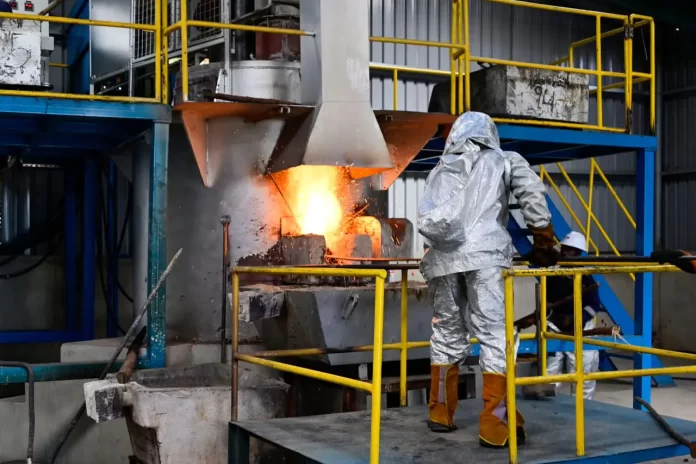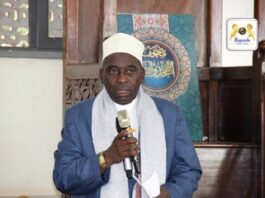President Yoweri Kaguta Museveni has launched Uganda’s first ever tin-smelting refinery as a move to advocate for value addition to products rather than exporting raw materials.
According to President Museveni, the refinery will boost Uganda’s revenue compared to exporting raw materials and importing finished goods.
“I spent the afternoon in Mbarara, where I commissioned the Wood Cross Tin Smelting Refinery, the first of its kind in Uganda. We are continuing in the right direction towards tackling the problem of ababaagyi (squanderers) of African wealth, abashema (uninformed), and traitors,” President Museveni said.
President Museveni, who cautioned against the betrayal and economic hemorrhage of those who only preferred to export Africa’s raw materials rather than export finished goods, emphasized how this is the way to go.
“This is part of the NRM’s 5th point in the 10-point program: building a horizontally and vertically integrated economy away from the inherited shame, betrayal, and economic hemorrhage of exporting raw materials and importing finished goods,” he added.
President Museveni, therefore, congratulated Wood Cross Resources for the invitation to witness a new victory in liberating Africa from slavery and thanked all the partners in various sectors of agriculture and energy who are contributing to the industrious effort of Uganda.
The Minister of Energy and Mineral Development, Ruth Nankabirwa Ssentamu, reported about Uganda’s tapestry of mineral resources, including over 27 varieties ranging from metals like gold, silver, and copper to industrial minerals such as phosphate and limestone, as well as gemstones like rubies and tourmaline, in which tin holds a significant place.
Minister Nankabirwa said that tin deposits in Uganda are found in Ntungamo, Isingiro, Mbarara, Kabale, and Kisoro districts in southwestern Uganda.
While tin is used in glass production, alloys with other metals, coatings for steel containers, solders for connecting pipes or electrical/electronic circuits, battery electrodes, and many other uses, will Uganda actually export finished products or will it continue to export raw materials like it has been happening with many other Ugandan products?
In her speech, Nakabirwa revealed that they have been able to realize and actualize integrated tin production, including value addition, by enacting the requisite policy, legal, and regulatory framework for efficient governance of the sub-sector.
The ministry noted that currently, the sector is governed by the Mining and Mineral Policy for Uganda 2018, the Mining and Minerals Act 2022, and the Mining and Mineral (Licensing) Regulations 2023, among others.
The Mining and Mineral Act, 2022, provides for: mineral value addition; promotion of value addition to minerals; and advocacy for strong linkages between the mineral sector, key infrastructure, agriculture, industries, and other sectors.
The history of tin mining in Uganda spans nearly a century, with notable discoveries dating back to the 1920s. Despite this legacy, much of the sector had remained non-mechanized and small-scale, lacking systematic evaluation and investment, according to the ministry.
As a result, the ministry said that key provisions of the Mining and Mineral Act, such as mineral value addition, competitive bidding, and the promotion of local content, underscore their commitment to maximizing the sector’s benefits for Ugandan citizens.
Additionally, Nakabirwa said that the adoption of the International Conference on Great Lakes Region (ICGLR) Regional Certification Mechanism demonstrates its resolve to combat illegal exploitation of natural resources.
Wood Cross Tin Smelting Company, having acquired the necessary certifications, stands ready to export tin bricks of the highest quality, something the ministry said will contribute to Uganda’s economic growth and development.
The State Minister of Energy and Mineral Development and the National Youth Representative, Phiona Nyamutoro, urged the youth to equip themselves with essential skills to utilize such opportunities.
Nyamutoro revealed that the smelting company will be processing pure tin at 99.95% concentrate, surpassing the international standards of 99.85%.
She added that value addition will make Uganda earn three times more than it has been earning from exporting the raw material from lsingiro and Ntungamo mines.
In an effort to fight unemployment especially among the youth and eradicate poverty in Uganda, the refinery is a source of employment not only the the youth from southwestern Uganda but across the country as it requires, miners, smelters, driver and other technicle staff to smoothly run the refinery, hence boosting the job market.
The refinery is also one way of marketing Ugandan products on the world market such as glasses, electrical circuits, and steel rodes, among others that will be produced from tin.
The refinery is attracting infrastructural development such as roads, airfield to be constructed in the area, and the construction of more hotels as well as attract tourists thus boosting the country’s revenue through tax collection.
The Tin Smelting Company, led by Omid Ameri and Mehdi Ali, operates in Ruhama mine (ML1466), a 40 km2 mining license in Ntungamo, Southwestern Uganda, with a production capacity exceeding 1,000 metric tons of London Metal Exchange (‘LME’) Grade A tin metal.










